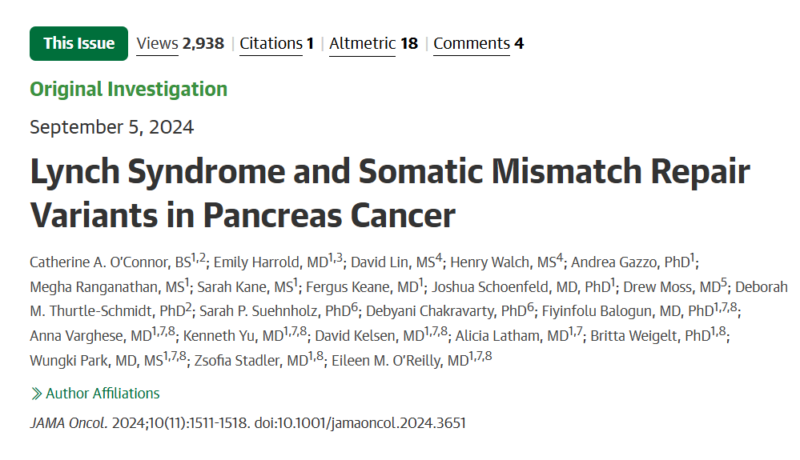Paolo Cotzia, Medical Director of Molecular Pathology and Head of Molecular Excellence at Sonic Healthcare USA, shared an article by Catherine A. O’Connor on LinkedIn:
“Lynch syndrome (LS) is a hereditary cancer predisposition syndrome caused by germline pathogenic variants and mutations in mismatch repair (MMR) genes: MLH1, MSH2, MSH6, PMS2, and EPCAM.
Patients harboring select germline variants have increased risks for various cancers, including pancreas cancer.
Mismatch repair deficiency (MMR-D) is a common occurrence in LS and it is often cause of microsatellite instability (MSI-H). Across all cancers, 70% to 85% of MSI-H cases occur in the absence of germline variants, and many are due to somatic MMR mutations.
Patients with MSI-H tumors frequently have responses to immune checkpoint blockade therapy.
The potential benefit of immunotherapy in this patient population highlights the paramount importance of identifying MMR/MS status in these tumors.
MMR IHC is commonly used by pathologist due to contained cost and quick turnaround time; however, results of IHC can be discordant when compared with other methodologies. NGS methods can be used to inform MMR/MS status, although cellularity is a common limitation to this technology.
Over the past years Artificial Intelligence (AI) MS classifiers are being developed to address limitations such as low cellularity.
This retrospective analysis conducted at Memorial Sloan Kettering Cancer Center (March 2012 – July 2023) included 55 patients with Pancreatic Cancer and either an LS germline pathogenic variant or somatic mismatch repair (MMR) variant.
Interestingly to conduct this study a composite MMR and MS status was determined using orthogonal methods, and an artificial intelligence classifier was used to account for low-cellularity specimens.
The study showed that across the cohorts, 6 MSI-I and 5 MSS cases on MSI Sensor were reclassified as MSI-H by the AI tool.
Since patients with MSI-H Pancreatic Cancer derive substantial benefit from immunotherapy, multiple modalities of MMR/MS testing should be considered to overcome single methodology limitations. In this setting AI classifiers may enhance MS interpretation and reclassify approximately 20% of cases.
When adequate tissue is available, a combination of IHC and next-generation sequencing testing may be the best approach. While when tissue is limited, next-generation sequencing should be prioritized. In either setting, AI tools can help classify low-cellularity samples.”
Lynch Syndrome and Somatic Mismatch Repair Variants in Pancreas Cancer.
Authors: Catherine A. O’Connor, et al.

Paolo Cotzia is the Medical Director of Molecular Pathology and Head of Molecular Excellence at Sonic Healthcare USA, as well as the Medical Director of Sonic Reference Laboratory. He is a board-certified pathologist specialized in oncologic surgical pathology and molecular genetics, with expertise in biomarker discovery, molecular diagnostics, digital pathology, AI, biobanking, and clinical trials.
For more Updates, Follow OncoDaily.


